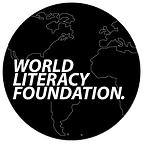Literacy Beyond Reading and Writing
Literacy Beyond Reading and Writing
Literacy is defined as the ability to read, write, speak, and listen, which to communicate effectively with one another (Department of Education and Training, n.d). However, in this generation, literacy goes beyond reading, comprehension, and writing skills. Literacy is an essential ability to participate actively and meaningfully in society.
On a global scale, UNESCO (2019) indicates that 773 million youth and adults cannot read and write, while 250 million children are failing to develop basic literacy skills. Based on this rate, individuals with poor literacy levels face difficulties in demonstrating their full potential in their communities.
Why is literacy important?
“Literacy is a fundamental human right and the foundation for lifelong learning.” -UNESCO
Let us think about it like this. How many times in a day do you use your reading skills for simple daily tasks? Remember this can include reading a newspaper, messages, signs on the street, food labels, and more.
In today’s world, adults are expected to have the ability to read as this is required for understanding legal documents, health paperwork, bill payments, and more (EduTrics, 2016).
Additionally, technology has evolved and showed us how basic means of communication are through social media, emails, messages, and phone calls. This demonstrates how essential basic reading and literacy skills are, to proceed with everyday life.
What are the causes of illiteracy?
Although the causes of illiteracy are different for everyone, here are some common factors that contribute to illiteracy in adults (Lal, 2015):
- Parents who had no or minimal schooling and education
- Poverty and challenging living conditions
- Learning disabilities
- Lack of books at home
- Lack of knowledge in home about the importance of reading
What are the effects of illiteracy?
Society
Literacy enables individuals to feel empowered to reach their full potential in life and contribute to society (UNESCO, 2019). Adequate levels of literacy within the society will help people differentiate real news from fake news. Having poor literacy can create misinterpretations and confusion on how to access basic health care needs, information, or how to access education (World Literacy Foundation [WLF], 2018).
Health
Based on previous research, individuals with low literacy skills have been closely associated with poor health outcomes (DeWalt et. al., 2004). On an individual approach, illiteracy influences a person’s ability to access and understand health information for themselves and their families. Poor literacy skills increase the chance of developing high-risk sexual behavior. This is based on the lack of knowledge about sexual and reproductive topics, along with inadequate education or no use of contraception (WLF, 2018).
Crime
According to a report from the Every Library Institute (2019), adults with low literacy levels are more likely to be unemployed and be dependent on criminal activities for their financial support. Previous research has indicated that 85 percent of juvenile delinquents are illiterate (WLF, 2018).
Education and welfare
Children with illiterate or low-literate parents are 72 percent more likely to have poor reading levels themselves. Hence, these children have higher chances of poor grades, behavioral problems, absenteeism, repeating school years, the habit of absenteeism, repeated school years, or drop-out (ProLiteracy, 2021). Additionally, work is prioritized more than schooling as functionally illiterate parents have lower expectations regarding education (WLF, 2018).
How can we reduce the bleak illiteracy rates?
It is challenging to fight the whole concept of illiteracy in the world, but we as individuals can take this fight step by step starting from early intervention. Developing literacy and language skills before formal schooling sets a child up for success in school and life. Here are some ways on how we can promote early childhood literacy.
Regular shared reading:
- Promotes vocabulary, listening, and comprehension skills.
- Creates a deeper understanding of print concepts.
Interacting with print:
- Looking at the print displayed in everyday life such as road signs, magazines, food packaging, posters, etc.
- Activities that include writing, tracing, and coloring are also really helpful in engaging children to learn and foster a love for reading.
Language games and songs:
- To develop listening and speaking skills
- To improve vocabulary, letter, and phonological awareness
- Songs that have rhyme, rhythm, and repetitiveness enable children to recognize, and memorize certain words and phrases.
Sources:
- Department of Education and Training. (n.d). What is literacy?
- Dewalt, D. A., Berkman, N. D., Sheridan, S., Lohr, K. N., & Pignone, M. P. (2004). Literacy and health outcomes: a systematic review of the literature. Journal of general internal medicine, 19(12), 1228–1239.
- EduTrics. (2015). How Literacy affects a Society — The importance of Education.
- Every Library Institute. (2019). The Crime and Library report.
- Lal. S. (2015). The Economic and Social Cost of Illiteracy: An Overview.
- ProLiteracy. (2021). Adult Literacy Facts.
- Tasmanian Government Department of Health. (n.d). Improving Adult Literacy.
- The Royal Children’s Hospital. (2008). Literacy in Early Childhood.
- United Nations Educational, Scientific and Cultural Organization [UNESCO]. Literacy. (2019).
- United Nations Educational, Scientific and Cultural Organization [UNESCO]. There are still 781 Million Illiterate Adults.
- U.S. Department of Education. (2014). The Impact of ABS Program Participation on Long-Term Economic Outcomes.
- World Literacy Foundation. (2018). The Economic and Social Cost of Illiteracy.
- Pictures from Unsplash
Subscribe to our Newsletter and receive the latest news about the literacy sector and updates on our work.
